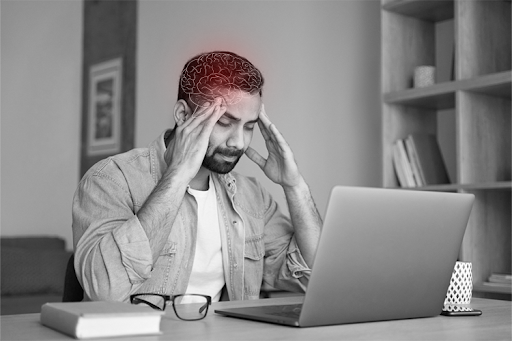Migraines: Simple Steps to Head Off the Pain
Jan 15, 2024
Introduction:
Migraines are intense headaches that can be debilitating, affecting millions of people worldwide. The pain, often accompanied by other symptoms like nausea and sensitivity to light and sound, can significantly disrupt daily life. While there's no one-size-fits-all solution for migraines, there are simple steps individuals can take to help head off the pain and manage their symptoms effectively. In this blog post, we'll explore various strategies and lifestyle changes that can contribute to migraine prevention and relief.

-
Identify Triggers:
Understanding and identifying triggers is a crucial step in managing migraines. Triggers vary from person to person and can include factors like certain foods, lack of sleep, stress, hormonal changes, and environmental factors. Keeping a migraine diary can help track potential triggers and enable individuals to make informed decisions about their lifestyle.
-
Maintain a Consistent Sleep Schedule:
Quality sleep is essential for overall health and well-being, and it plays a significant role in migraine prevention. Irregular sleep patterns and insufficient sleep can trigger migraines in some individuals. Establishing a consistent sleep schedule by going to bed and waking up at the same time every day, even on weekends, can help regulate sleep patterns and reduce the risk of migraines.
-
Stay Hydrated:
Dehydration is a common trigger for migraines. Individuals should ensure they stay adequately hydrated by drinking enough water throughout the day. Avoiding excessive caffeine and alcohol consumption, both of which can contribute to dehydration, is also recommended.
-
Manage Stress:
Stress is a well-known trigger for migraines, and finding effective stress management techniques is crucial for prevention. Incorporating relaxation techniques such as deep breathing, meditation, yoga, or regular exercise into daily routines can help reduce stress levels and minimize the likelihood of migraine attacks.
-
Regular Exercise:
Regular physical activity has numerous health benefits, including migraine prevention. Engaging in moderate aerobic exercise, such as walking, swimming, or cycling, for at least 30 minutes a day can contribute to overall well-being and reduce the frequency and intensity of migraines.
-
Dietary Changes:
Certain foods and food additives may trigger migraines in susceptible individuals. Common culprits include aged cheeses, chocolate, caffeine, and artificial sweeteners. Experimenting with an elimination diet under the guidance of a healthcare professional can help identify specific dietary triggers and allow for personalized dietary adjustments.
-
Consider Supplements:
Some individuals may benefit from specific supplements to help prevent migraines. Magnesium, riboflavin (vitamin B2), and coenzyme Q10 are among the supplements that have shown promise in reducing the frequency and severity of migraines. However, it's crucial to consult with a healthcare provider before starting any supplement regimen.
-
Stay Informed About Medications:
For those with chronic or severe migraines, medications prescribed by a healthcare professional may be necessary. Staying informed about available medications, their potential side effects, and incorporating them into a comprehensive migraine management plan can be crucial for those who require medical intervention.
Conclusion:
Migraines can be challenging to manage, but adopting a proactive approach through lifestyle changes and targeted strategies can significantly improve one's quality of life. By identifying triggers, maintaining a consistent sleep schedule, managing stress, and making dietary and lifestyle adjustments, individuals can take important steps to head off the pain associated with migraines. As always, it's essential to work closely with healthcare professionals to develop a personalized and effective migraine management plan.









